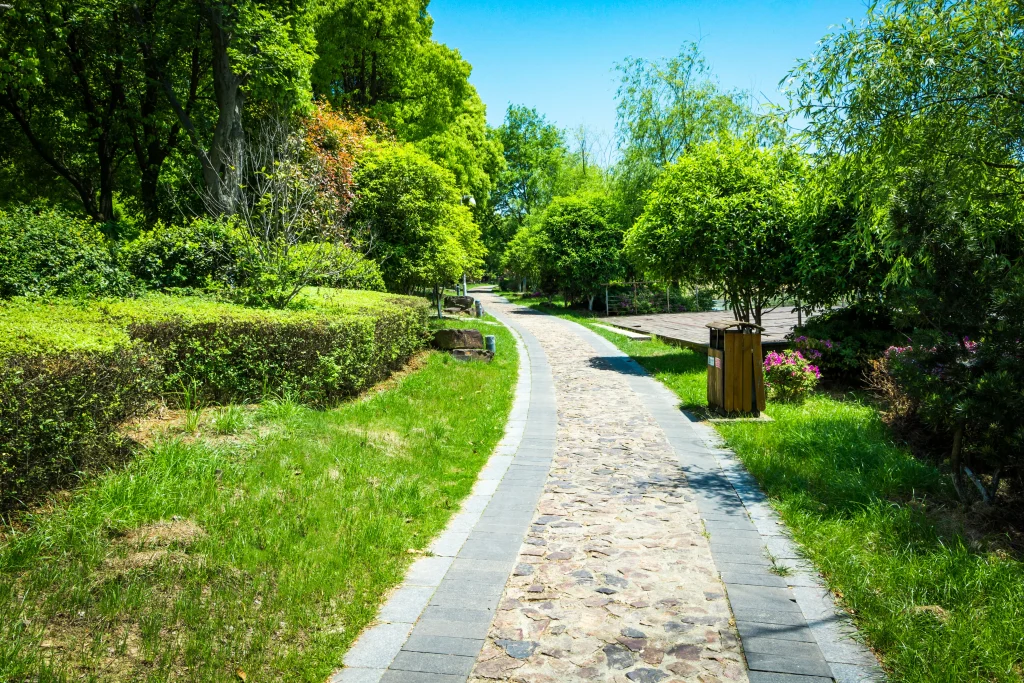How to keep raccoons out of your yard? To keep raccoons out of your yard, focus on removing potential food sources, securing your trash, and trying to deter them with physical barriers and strong deterrents.
Raccoons (Procyon lotor) rank among the most persistent urban wildlife concerns in our Colorado communities. These intelligent creatures adapt quickly to urban environments, causing frustration for homeowners who wake to overturned trash cans and damaged gardens.
In this comprehensive guide, you’ll discover how to identify raccoon activity, implement effective deterrents, and prevent future invasions using legal and humane methods specifically tailored for Denver’s urban and suburban environments.
By understanding raccoon behavior and applying strategic prevention techniques, you can protect your property while respecting wildlife regulations.
Signs Raccoons Have Invaded Your Yard
Before implementing solutions, confirm raccoons cause your yard problems by identifying these definitive signs:
- Tipped garbage containers with scattered trash surrounding your property
- Disturbed garden beds with shallow, cone-shaped holes or damaged plants
- Distinctive footprints resembling tiny human handprints with five toes (typically 2-3 inches long)
- Nighttime activity including scratching, chattering, or thumping sounds between dusk and dawn
- Designated latrine areas where raccoons repeatedly leave droppings (often on elevated surfaces like woodpiles or roofs)
- Missing pet food or emptied bird feeders with characteristic scattered hulls
- Damaged lawn areas where raccoons have rolled back sod searching for grubs or insects
- Water disturbances in ponds or water features with partially consumed fish or amphibians
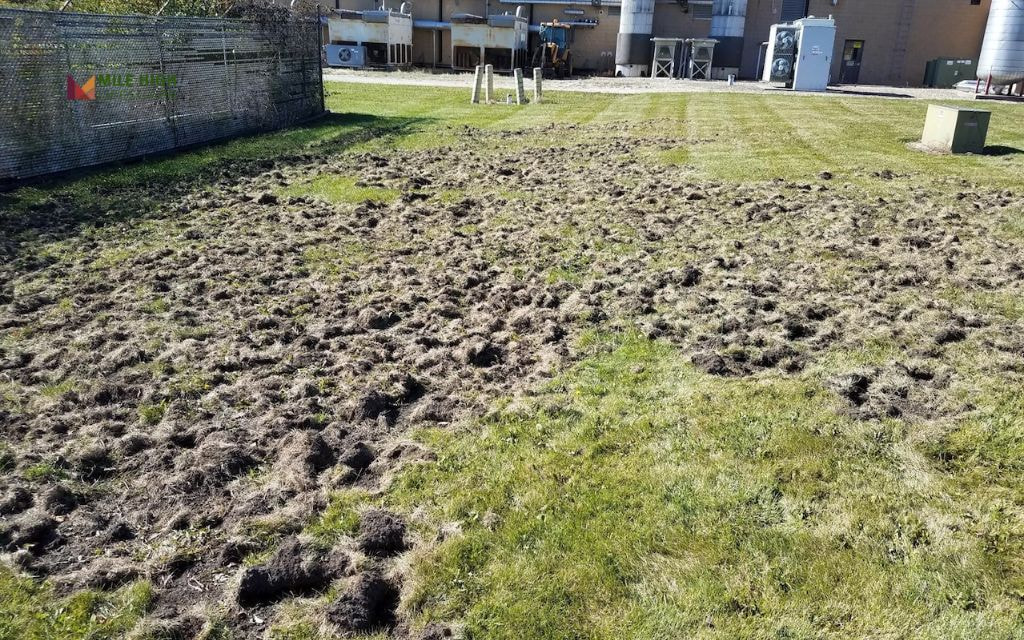
How to Keep Raccoons Out of Your Yard: Top 10 Proven Methods
Denver residents can employ multiple strategies to deter raccoons. These methods focus on making your property less attractive and accessible to these persistent animals while maintaining humane practices in line with Colorado wildlife regulations.
Here are 10 ways to keep raccoons out of your yard:
- Secure trash bins
- Remove pet food, bird seed, and leftovers
- Harvest or fence off gardens and fruit trees
- Compost carefully
- Seal off entry points under structures
- Install motion-activated lights or sprinklers
- Use natural repellents
- Install fencing with a top curve
- Use noise and light strategically
- Consider humane trapping (with caution)
#1: Secure Trash Bins
Unsecured garbage is the number one attractant for urban raccoons in Denver. Their sensitive noses can detect food scraps from impressive distances, and their nimble paws make quick work of most standard trash containers.
- Use animal-proof bins with locking lids or secure existing bins with bungee cords, ropes, or specialized wildlife-resistant straps
- Store bins inside garages or sheds until collection day whenever possible
- Clean bins regularly with ammonia-based cleaners to eliminate food odors
- For curbside collection, wait until morning rather than placing bins out overnight
#2: Remove Pet Food, Bird Seed, and Leftovers
Any outdoor food source serves as an open invitation to raccoons and other wildlife.
- Feed pets indoors or remove food bowls immediately after feeding
- Store pet food in airtight, chew-proof containers
- Use bird feeders with catch trays to minimize seed spillage, and consider taking feeders in at night during active raccoon seasons
- Clean outdoor eating areas thoroughly after barbecues or picnics
- Avoid composting meat, dairy, or strong-smelling food scraps in accessible compost bins
#3: Harvest or Fence Off Gardens and Fruit Trees
Denver’s growing urban gardening movement has inadvertently created more food sources for raccoons.
- Pick ripe produce promptly, especially sweet corn and tomatoes, which are raccoon favorites
- Install garden fencing at least 12 inches below ground (to prevent digging) and 4 feet above ground with the top portion bent outward at a 45-degree angle
- Consider using motion-triggered deterrents specifically around garden areas
- Place netting over fruit trees and berry bushes during ripening seasons
- Use companion planting with strongly-scented herbs like rosemary, oregano, and sage which raccoons typically avoid
#4: Compost Carefully
Proper composting practices help minimize raccoon attraction while still allowing you to maintain eco-friendly yard waste management.
- Use sealed compost bins with secure lids rather than open compost piles
- Never compost meat, fish, dairy, oils, or egg products
- Add a layer of dry leaves or soil after adding food scraps to minimize odors
- Consider installing your compost bin on a concrete pad with hardware cloth underneath to prevent access via digging
- For severe raccoon problems, temporarily switch to green-waste-only composting (leaves, grass clippings, plant material)
#5: Seal Off Entry Points Under Structures
Raccoons seek shelter under decks, sheds, porches, and crawl spaces – particularly females looking for safe denning sites during spring breeding season.
- Install heavy-gauge hardware cloth (¼-inch mesh) around the perimeter of elevated structures
- Extend the barrier at least 12 inches below ground and bend outward at the bottom to discourage digging
- Secure the top edge firmly to the structure to prevent raccoons from pulling it away
- Ensure all potential entry points to attics, chimneys, and roof vents are sealed with appropriate wildlife-proof materials
- Check regularly for new damage or digging attempts, especially after storms
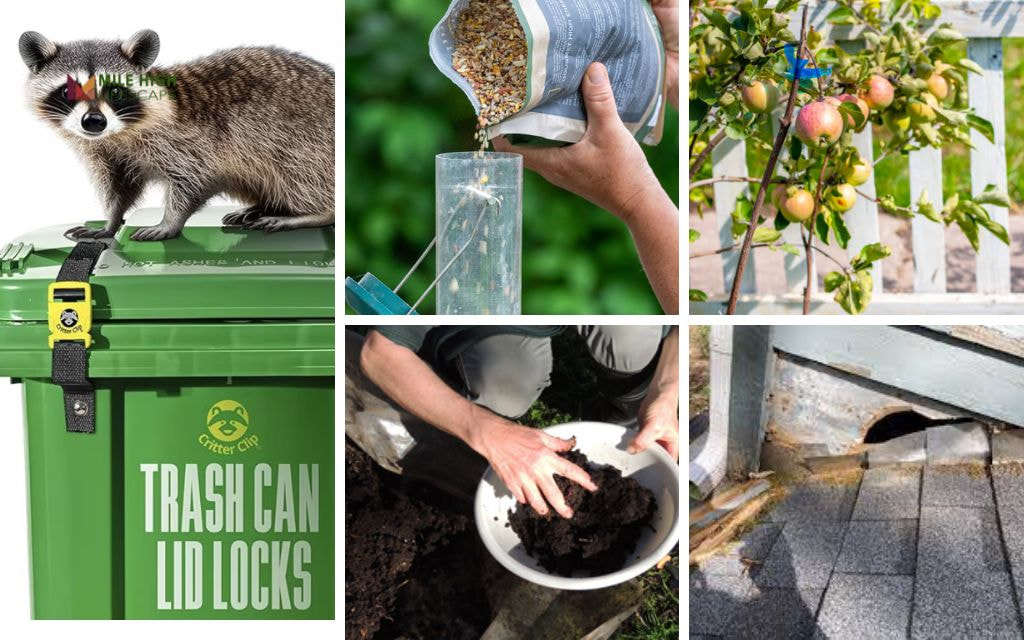
#6: Install Motion-Activated Lights or Sprinklers
Sudden stimuli can startle and deter raccoons during their nighttime activities.
- Position motion-activated flood lights around key areas like trash storage, garden beds, and potential entry points
- Install motion-activated sprinkler systems (like the Orbit Yard Enforcer) around gardens and landscaped areas
- Combine multiple deterrent types for maximum effectiveness
- Regularly change the location of deterrents to prevent raccoons from becoming habituated
- Consider solar-powered options for energy efficiency and flexibility in placement
#7: Use Natural Repellents
Several natural substances emit odors that raccoons find offensive without harming them or the environment.
- Place ammonia-soaked rags in strategic locations (replacing frequently as the smell dissipates)
- Create a repellent spray by mixing cayenne pepper and hot sauce with water and a small amount of dish soap
- Sprinkle used coffee grounds around garden perimeters and near trash storage areas
- Apply predator urine granules (available at garden centers) around the yard’s perimeter
- Reapply all repellents after rain or irrigation and rotate between different types to prevent habituation
#8: Install Fencing with a Top Curve
For properties experiencing severe raccoon problems, specialized fencing can provide the most reliable protection.
- Install perimeter fencing at least 4 feet high with the top 12-18 inches angled outward at 45 degrees
- Use smooth materials that cannot be easily climbed (metal or vinyl rather than wood)
- For existing wooden fences, add a “roller bar” at the top that spins when raccoons attempt to climb over
- Ensure gates close securely with no gaps at bottom or sides
- Combine fencing with below-ground barriers in areas where digging is possible
#9: Use Noise and Light Strategically
Raccoons prefer quiet, dark environments for feeding and denning. Disrupting this comfort can discourage them from settling on your property.
- Place a battery-operated radio (tuned to a talk station) near known raccoon activity areas
- Install solar-powered flashing lights around gardens or near potential den sites
- Use ultrasonic animal repellers in targeted areas (though effectiveness varies)
- For denning raccoons, temporarily place a bright light in the den area
- Alternate and relocate deterrents regularly to prevent habituation
#10: Consider Humane Trapping (With Caution)
In severe cases where other methods have failed, trapping may be necessary but should only be done in accordance with Colorado laws and guidelines.
- Contact Colorado Parks & Wildlife (303-297-1192) or Denver Animal Protection (720-913-1311) for guidance before attempting to trap
- Only use humane live traps designed for raccoon-sized animals
- Be aware that relocation requires permits in many cases and is restricted to within 10 miles of the capture site under Colorado regulations
- Never attempt to trap during spring when mothers may have dependent young nearby
- Consider hiring a professional wildlife control operator licensed in Denver for complicated situations
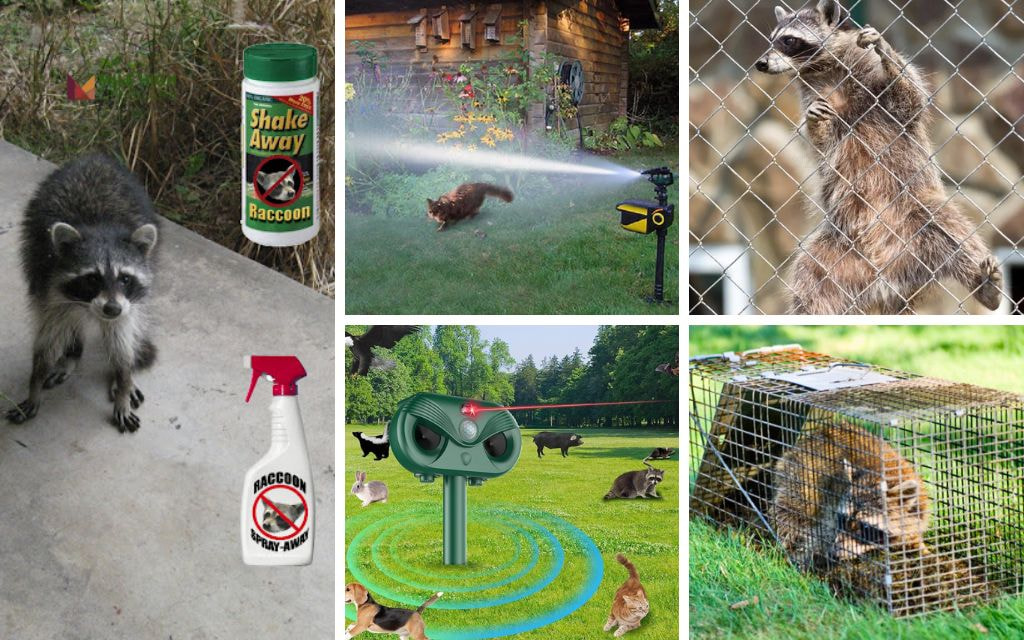
What Not To Do When Dealing With Raccoons
Avoid these counterproductive or illegal approaches:
- Never use poisons: they create unnecessary suffering, threaten pets and other wildlife, and violate Colorado wildlife protection laws
- Don’t attempt DIY relocation: this practice requires specialized permits and potentially spreads disease to new areas
- Avoid blocking entry points during spring breeding season (March-June) without verifying no young raccoons remain inside
- Don’t leave traps unmonitored: trapped animals require prompt attention to prevent stress and dehydration
- Never approach or handle raccoons – they may carry diseases and will defend themselves aggressively when threatened
- Don’t use mothballs – they’re ineffective against raccoons and release toxic chemicals into your environment
- Avoid makeshift deterrents like broken glass or nails which violate animal cruelty statutes
- Don’t ignore property damage as it typically worsens without intervention
Prevention Tips for Denver Properties
Maintain comprehensive raccoon defense throughout Colorado’s seasonal cycles:
- Conduct monthly property inspections focusing on potential entry points and evidence of activity
- Install permanent landscape lighting in dark corners and potential hiding spots
- Trim tree branches maintaining minimum 8-foot clearance from rooflines and structures
- Replace loose mulch with river rock or gravel in sensitive areas near foundations
- Schedule professional pest-proofing evaluations annually, particularly before spring breeding season
- Maintain chimney caps and roof vent screens, inspecting after severe weather events
- Keep woodpiles elevated and positioned away from structures
- Clear debris piles following storms or landscaping activities
- Consider motion-activated wildlife cameras to monitor activity patterns
- Coordinate with neighbors for community-wide prevention strategies
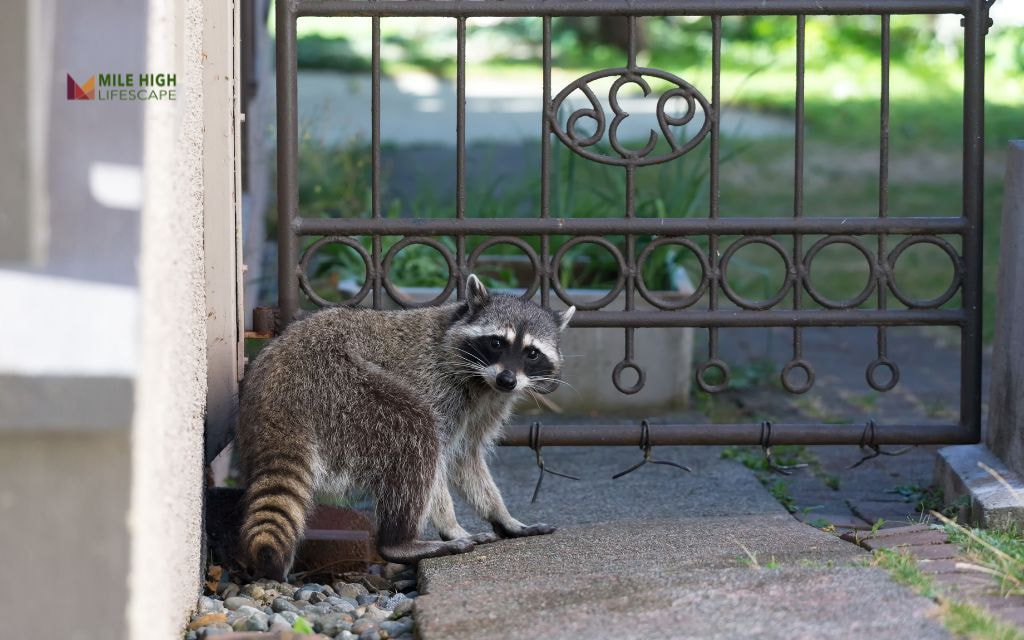
Conclusion
Managing raccoon problems requires persistence and strategic planning. By eliminating food sources, creating physical barriers, and implementing deterrents, Denver homeowners can protect their landscapes from these clever creatures.
Remember that prevention works more effectively than reaction. Implement multiple methods simultaneously for the best results, and maintain vigilance even after raccoon activity subsides.
Frequently Asked Questions (FAQs)
What do raccoons hate the most?
Raccoons intensely dislike ammonia, vinegar, garlic, hot pepper, predator urine, sudden bright lights, unexpected loud noises, and water spray. Their sensitive paws also avoid sticky or uncomfortable surfaces like aluminum foil or prickly materials.
How do I keep raccoons out of my yard at night?
- Install motion-activated LED floodlights around property perimeters
- Remove all food sources before dusk, secure trash containers with locking lids
- Apply commercial repellents around boundaries
- Deploy ultrasonic devices targeting raccoon frequencies
- Maintain landscape lighting in dark corners
- Secure pet doors overnight
- Consider installing sensor-activated sprinklers near critical areas
- Eliminate water sources
Does Irish Spring soap keep raccoons away?
Yes, Irish Spring soap emits a strong scent raccoons find genuinely unpleasant. Cut bars into 1-inch chunks and place them in mesh bags around gardens, entry points, or problem areas. Replace monthly or after heavy rainfall for continued effectiveness. The menthol and other aromatic compounds irritate raccoons’ sensitive olfactory systems without causing harm.
What is the best homemade raccoon repellent?
The most effective homemade raccoon repellent combines one tablespoon cayenne pepper, one chopped onion, one chopped jalapeño pepper, and two cups of boiling water. After cooling, strain the mixture and add one teaspoon of dish soap (which helps it adhere to surfaces). Transfer to a spray bottle and apply to affected areas weekly and after rainfall. This mixture irritates raccoons’ sensitive noses without causing permanent harm.
Do coffee grounds repel raccoons?
Yes, used coffee grounds create an effective odor barrier raccoons typically avoid. Sprinkle fresh grounds thickly around plants, garden borders, and potential entry points. Coffee grounds provide the additional benefit of enriching soil with nitrogen while deterring wildlife. The grounds’ strong smell and granular texture create an unpleasant sensory experience for raccoons’ sensitive paws and noses.
